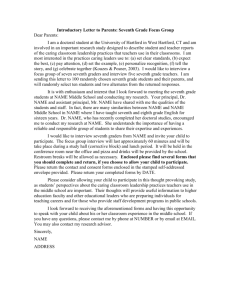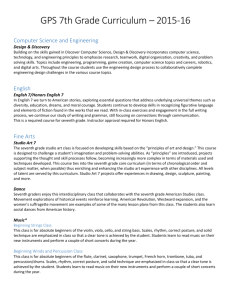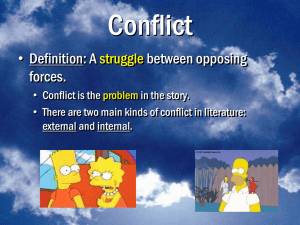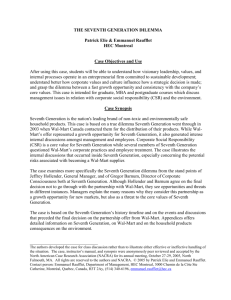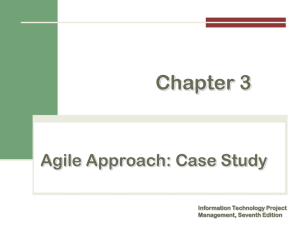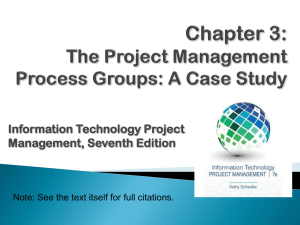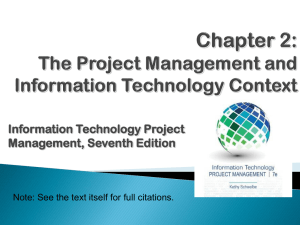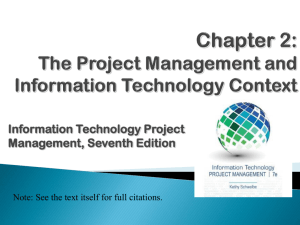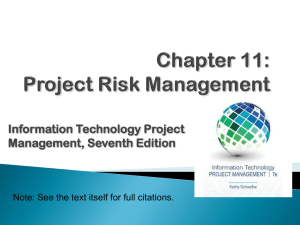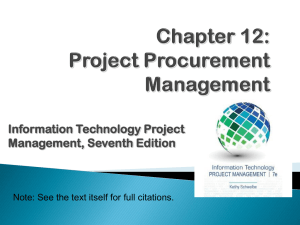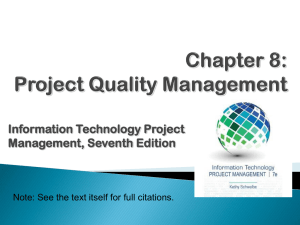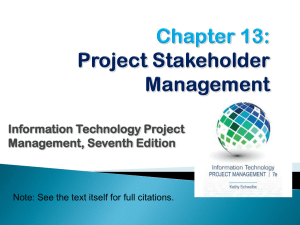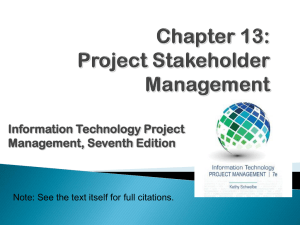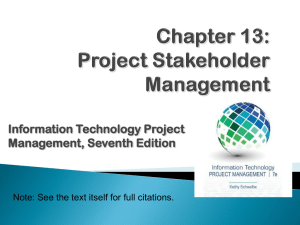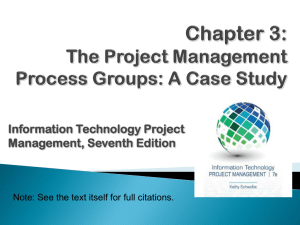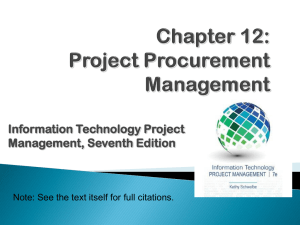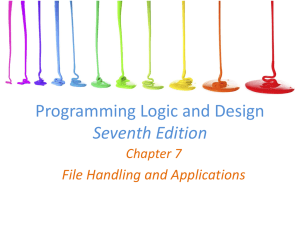02_Ch2
advertisement
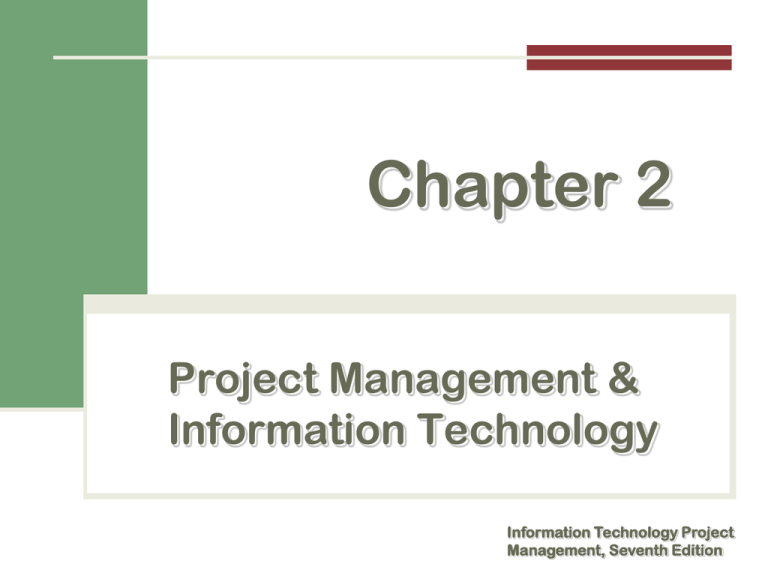
Chapter 2 Project Management & Information Technology Information Technology Project Management, Seventh Edition Learning Objectives Describe the systems view of project management and how it applies to information technology (IT) projects Understand organizations, including the four frames, organizational structures, and organizational culture Explain why stakeholder management and top management commitment are critical for a project’s success Information Technology Project Management, Seventh Edition 2 Learning Objectives Understand the concept of a project phase and the project life cycle, and distinguish between project development and product development Discuss the unique attributes and diverse nature of IT projects Describe recent trends affecting IT project management, including globalization, outsourcing, virtual teams, and agile project management Information Technology Project Management, Seventh Edition 3 Projects Cannot Be Run In Isolation Projects must operate in a broad organizational environment Project managers need to use systems thinking Senior managers must make sure projects continue to support current business needs 4 A Systems View of Project Management A systems approach emerged in the 1950s to describe a more analytical approach to management and problem solving Includes: Systems philosophy Systems analysis Systems management 5 Three Sphere Model for Systems Management Information Technology Project Management, Seventh Edition 6 Perspectives on Organizations Information Technology Project Management, Seventh Edition 7 What Went Wrong? • In a paper titled “A Study in Project Failure,” two researchers examined the success and failure of 214 IT projects over an eight-year period in several European countries. • The researchers found that only one in eight (12.5 percent) were considered successful in terms of meeting scope, time, and cost goals. • The authors said that the culture within many organizations is often to blame • Among other things, people often do not discuss important leadership, stakeholder, and risk management issues Information Technology Project Management, Seventh Edition 8 Factors Influencing IT Project Management Organizational Structure Organizational Culture Top Management Commitment Stakeholder Management Commitment to IT IT Governance/Organizational Standards 9 Organizational Structures 3 basic organization structures Functional Project Matrix 10 Organizational Structure Influences on Projects Information Technology Project Management, Seventh Edition 11 Organizational Culture Organizational culture is a set of shared assumptions, values, and behaviors that characterize the functioning of an organization Characteristics of Org. Culture Member identity* Risk tolerance* Group emphasis* Reward criteria* People focus Conflict tolerance* Unit integration* Means-ends orientation Control Open-systems focus* 12 Top Management Commitment People in top management positions are key stakeholders in projects A very important factor in helping project managers successfully lead projects is the level of commitment and support they receive from top management How does Top Management help a project? 13 Stakeholder Management Project managers must take time to identify, understand, and manage relationships with all project stakeholders Using the four frames of organizations can help meet stakeholder needs and expectations Who is often considered one of the most important stakeholders? 14 Organizational Commitment to IT If the organization has a negative attitude toward IT, it will be difficult for an IT project to succeed Having a Chief Information Officer (CIO) at a high level in the organization helps IT projects Assigning non-IT people to IT projects also encourage more commitment Information Technology Project Management, Seventh Edition 15 IT Governance / Standards IT governance addresses the authority and control for key IT activities in organizations, including IT infrastructure, IT use, and project management Standards PMO or simply having templates/forms Example: Texas Tech IT PM Standards 16 Project Phases and the Project Life Cycle A project life cycle is a collection of project phases that defines what work will be performed in each phase what deliverables will be produced and when who is involved in each phase, and how management will control and approve work produced in each phase A deliverable is a product or service produced or provided as part of a project Information Technology Project Management, Seventh Edition 17 Phases of the Traditional Project Life Cycle 18 Product Life Cycles The Systems Development Life Cycle (SDLC) is a framework for describing the phases involved in developing and maintaining information systems Systems development projects can follow Predictive life cycle Adaptive Software Development (ASD) life cycle 19 Examples of Predictive Life Cycle Models Waterfall model Spiral model Incremental build model Prototyping model Rapid Application Development (RAD) model 20 Agile Software Development Agile software development has become popular to describe new approaches that focus on close collaboration between programming teams and business experts 21 The Importance of Project Phases and Management Reviews A project should successfully pass through each of the project phases in order to continue on to the next Management reviews, also called phase exits or kill points, should occur after each phase to evaluate the project’s progress, likely success, and continued compatibility with organizational goals 22 What Went Right? "The real improvement that I saw was in our ability toin the words of Thomas Edisonknow when to stop beating a dead horse.…Edison's key to success was that he failed fairly often; but as he said, he could recognize a dead horse before it started to smell...In information technology we ride dead horsesfailing projectsa long time before we give up. But what we are seeing now is that we are able to get off them; able to reduce cost overrun and time overrun. That's where the major impact came on the success rate.”* Many organizations, like Huntington Bancshares, Inc., use an executive steering committee to help keep projects on track. *Cabanis, Jeannette, "'A Major Impact': The Standish Group's Jim Johnson On 23 7 Project Management and IT Project Success," PM Network, PMI, Sep.1998, p. The Context of IT Projects Diverse in terms of size, complexity, products produced, application area, and resource requirements Diverse IT Project Team Members Diverse Technologies 24 Article: Tech Project and Direction What have they been doing due to the recession and what direction are the moving into? What are some of the top projects? What industries are seeing growth in major IT projects? 25 Article: Project Management & Software Development Software development projects have distinct characteristics not found in other projects Based on the article, what are some of these characteristics? Which did you feel was the number one mistake a PM could do in software development projects? 26 Closer to home….State Projects • Were state IT projects considered to be successful? • What were some of the main issues with state IT projects? • What are the recommendations for the review board? • Do you feel these are sufficient to fix the issues? Information Technology Project Management, Seventh Edition 27 Improving Likelihood of Success for IT Projects • Value-Driven Approach • Socio-Technical Approach • Commit to Project Management Principles (Chaos Report) • Knowledge-Management Approach 28 Recent Trends Affecting IT Project Management Globalization Outsourcing Virtual teams Information Technology Project Management, Seventh Edition 29 Important Issues and Suggestions Related to Globalization Issues Communications Trust Common work practices Tools Suggestions Employ greater project discipline Think global but act local Keep project momentum going Use newer tools and technology 30 Outsourcing Organizations remain competitive by using outsourcing to their advantage, such as finding ways to reduce costs Their next challenge is to make strategic IT investments with outsourcing by improving their enterprise architecture to ensure that IT infrastructure and business processes are integrated and standardized 31 Virtual Teams: Advantages/Disadvantages Advantages: Increasing competiveness and responsiveness Lowering costs Increased expertise and flexibility Increased work/life balance Disadvantages: Isolation &Interpersonal Relationships Communication Problems Dependence on Technology 32 Approaches and Philosophy eXtreme Project Management (XPM) Holistic veiw of planning and managing Projects don’t always fit traditional scheduling and formal techniques (they are chaotic) Focuses on the “human side” of PM Agile Project Management Iterative, incremental approach Popular http://www.pmi.org/Certification/New-PMI-AgileCertification.aspx 33 Discussion Given our past two lectures, do you feel it is harder to manage an IT project compared to a traditional project? Name a few approaches you would use to manage stakeholders. Information Technology Project Management, Seventh Edition 34 Chapter Summary Systems approach when working on projects Organization frames: structural, human resources, political, and symbolic Project managers need to consider several factors due to the unique context of information technology projects Recent trends affecting IT project management include globalization, outsourcing, virtual teams, and Agile Information Technology Project Management, Seventh Edition 35
